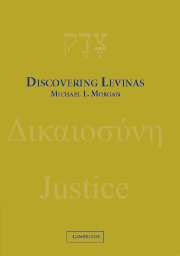Book contents
- Frontmatter
- Contents
- Preface
- Acknowledgments
- 1 Auschwitz, Politics, and the Twentieth Century
- 2 Phenomenology and Transcendental Philosophy
- 3 The Ethical Content of the Face-to-Face
- 4 Philosophy, Totality, and the Everyday
- 5 Meaning, Culture, and Language
- 6 Subjectivity and the Self
- 7 God and Philosophy
- 8 Time, Messianism, and Diachrony
- 9 Ethical Realism and Contemporary Moral Philosophy
- 10 Beyond Language and Expressibility
- 11 Judaism, Ethics, and Religion
- Conclusion: Levinas and the Primacy of the Ethical – Kant, Kierkegaard, and Derrida
- Appendix: Facing Reasons
- Bibliography
- Index
5 - Meaning, Culture, and Language
Published online by Cambridge University Press: 05 June 2012
- Frontmatter
- Contents
- Preface
- Acknowledgments
- 1 Auschwitz, Politics, and the Twentieth Century
- 2 Phenomenology and Transcendental Philosophy
- 3 The Ethical Content of the Face-to-Face
- 4 Philosophy, Totality, and the Everyday
- 5 Meaning, Culture, and Language
- 6 Subjectivity and the Self
- 7 God and Philosophy
- 8 Time, Messianism, and Diachrony
- 9 Ethical Realism and Contemporary Moral Philosophy
- 10 Beyond Language and Expressibility
- 11 Judaism, Ethics, and Religion
- Conclusion: Levinas and the Primacy of the Ethical – Kant, Kierkegaard, and Derrida
- Appendix: Facing Reasons
- Bibliography
- Index
Summary
In Chapter 2, in our discussion of Levinas's method, we tried to show how Levinas's account of the face is phenomenological and yet not so, how the face both is and is not a Husserlian noema. In Chapter 4, we discussed Levinas's notion of totality and how the face and the ethical, as the infinite, lie outside totality. At one level, notions of truth, meaning, and reference occur within the orbit of language, thought, and our theories about them. Insofar as the face and engagement with the suffering and demands of the other person open a different perspective on human existence than that of language and so forth, the notions of “meaning” and “sense” are, strictly speaking, inappropriate. But Levinas does use them to characterize the face, and we ought to examine both how and why, in order to understand better the face-to-face and its role in everyday life.
MEANING, RELATIVISM, AND THE ETHICAL
We eventually must look at Levinas's later work, Otherwise Than Being, but before we do there is an important essay of 1964, “Meaning and Sense,” that we should discuss. From one point of view, the background for this essay is the problem of relativism and invokes Edmund Husserl, Martin Heidegger, and Maurice Merleau-Ponty. But the theme of meaning and sense is pervasive in twentieth-century philosophy; and as we proceed, it may be useful to draw on a philosophical tradition different from Levinas's – the tradition of Gottlob Frege, Ludwig Wittgenstein, W. V. Quine, Donald Davidson, and others – in order to clarify what the issues are for him and what he is trying to accomplish.
- Type
- Chapter
- Information
- Discovering Levinas , pp. 115 - 142Publisher: Cambridge University PressPrint publication year: 2007



